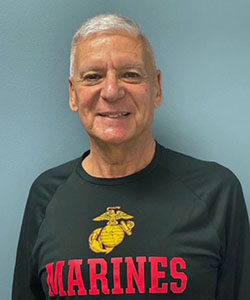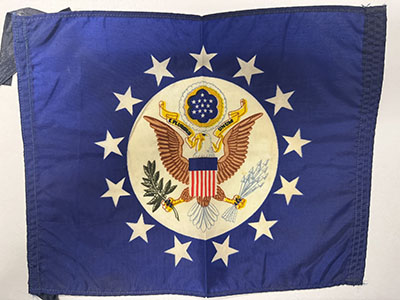Marines Vietnam War Arlington Heights, IL Flight date: 05/14/25
By Mark Splitstone, Honor Flight Chicago Veteran Interview Volunteer
John Cosentino was born into a large, old-school Italian family in Orland Park in 1952. He describes himself as a mediocre student, but there was always a part of him that believed he could achieve bigger things if he had more self-discipline. By the time he reached his senior year of high school, he decided that he needed to address this fault before he faced the challenges of college. Combining that desire with a sense of patriotism and service to others, John’s solution was to join the military, and not just any branch of the military, but the one he considered the toughest—the Marines. While John’s family was patriotic, they didn’t have much of a military background, so when he told his plans to his parents, they were surprised, and in his father’s case, disappointed. Despite his father’s disapproval, in John’s senior year of high school he enlisted for a four-year term. He graduated on a Sunday in 1970, and by the following Tuesday, he was on his way to MCRD San Diego. He felt an overall lack of excitement from his community when he left, perhaps because of weariness from the Vietnam War.
When the bus stopped at the base, the drill sergeant began throwing the young men, one by one, out the door. John recalls thinking that one of the reasons he had enlisted was to have someone “kick his ass,” but he hadn’t realized that would happen, quite literally, on his first day. Several weeks later, John received his draft card in the mail. His number was low, meaning he almost certainly wouldn’t have been drafted and was therefore facing the challenges of boot camp solely because he had volunteered. However, as opposed to most people who endure boot camp, John enjoyed it. He found satisfaction in meeting one challenge and then moving on to the next one. Also, because he had needed to work every day after school, he rarely participated in sports. He figures that he probably had a lot of pent-up competitiveness, and that’s what he displayed at boot camp. One lasting memory of that time is that on weekends the recruits would sometimes be sent to San Diego to act as riot control at Vietnam War protests. It was strange to realize that the protestors were probably the same age as the recruits. When he originally enlisted, John had hoped to go to Vietnam, but by the middle of 1970 American involvement in the war was winding down, and rather than sending more troops there, the military was bringing them home.
After boot camp, John attended combat and advanced weapons training at Camp Pendleton. His aptitude exam had shown that he’d be a good fit for electronics or radio repair, so after Camp Pendleton he went to the Marine Corps Air Ground Combat Center in 29 Palms California. After graduating first in his radio repair class, John was promoted to corporal and assigned to the Naval Amphibious Base in Little Creek, Virginia. He was tasked with repairing radios that were sent back from Vietnam, but by this point in the war, very few were coming back so there wasn’t much for him to do. This was when he met the first of several mentors he would encounter in the service. This major saw potential in John and told him that he needed to stay busy, stay in shape, and learn new skills. He also suggested that he not stay at that base because his talents would be wasted there and recommended that John apply to become an embassy guard. The Embassy Guard program draws from the top echelon of Marines and requires a very detailed application process. John recalls hearing from friends and family back home who told him that the government was asking questions about John’s background. John was accepted into the program and went to Washington, DC to complete six weeks of embassy guard training.
Upon completing his training, John was allowed to pick his first station, and while many Marines chose exotic places, John chose Columbo, Sri Lanka, about as far away from home as he could be. Shortly after he got there a protest against the Vietnam War turned violent and the embassy was attacked. John and the other Marines barricaded the staff in the embassy, as cars were overturned and a Molotov cocktail was thrown. Fortunately, the protestors didn’t try to breach the embassy, because at that time the Marines were armed with only pistols and shotguns. While John found Sri Lanka to be interesting and most people to be friendly, the Marines and other staff faced limitations on where they could travel because some areas of the country were dangerous.
Sri Lanka was considered a hardship post, so John was able to leave after only one year, at which point he was assigned to NATO headquarters in Brussels. Donald Rumsfeld was ambassador to NATO at the time, and John recalls saying hi to him every day. He also recalls hearing that Rumsfeld played tennis every morning, and one day he asked him how his game was. Rumsfeld glared at John, who later was told never to ask Rumsfeld about his personal life. After Brussels, John’s next stop was the US Embassy in Moscow. At the time, repairs were being made to the embassy, and since Russians were doing much of the work, the embassy needed extra guards to ensure there weren’t any security breaches. The security at this Cold War-era building was impressive and included a “room inside a room,” which was a bubble constructed of plexiglass on the floors, walls, and ceiling, to make it impossible to plant a bug.


Since they weren’t allowed to fraternize with Russians, the Marines lived in an apartment on the top floor of the embassy. They would occasionally see Russians with binoculars on neighboring rooftops, presumably spying on them. The Marines would spy right back and occasionally give them other gestures. The Marines had a Russian cook and housekeeper, who would sometimes ask them questions about their families or other personal information. They were all trained not to divulge even seemingly innocuous facts about themselves, knowing that there was a risk that the information could be used to compromise them. One memorable moment from his time in Moscow was when President Nixon visited there in 1972. John was stationed outside the office Henry Kissinger was using for the visit, and he also saw Alexander Haig on a regular basis. While John never got to see Nixon, he was able to befriend Nixon’s driver during the week-long summit. After Nixon left, John asked the driver if he could have the presidential flag from the car that Nixon had been using. John still has that flag to this day.
His next assignment was in Frankfurt, Germany, at the headquarters of the Marine Security Guard in Europe. While there, he worked closely with Medal of Honor winner and famous Marine, Wesley Fox. Just being in the presence of this legend made John want to be at the top of his game every day. John had a choice for his last post and chose Dublin, where he loved both the country and the people. After six months there his enlistment was up. He had enjoyed his time in the Marines and considered re-enlisting, but decided it was time to return home and go to college.
Just like when he left for the service in 1970, there was very little fanfare when he returned home in 1974. The basic attitude was that it was time for him to get a job and go to work. He started college almost immediately, studying philosophy and history at the University of St. Francis in Joliet. He would attend classes in the morning and then work in the afternoons and evenings. Upon graduating from college in 1978, he went to work in business, focusing on marketing communications, project management, and continuous improvement. He eventually earned his MBA from the University of Chicago and has worked at a variety of healthcare and manufacturing firms. He still works full-time but is considering retiring at the end of the year, at age 73.
Throughout his life, John has been very active and has gone on fifteen “epic” hiking and biking trips all around the country, including Death Valley, Mt. Whitney, the Sierra Nevadas, Canada, and Alaska. He underwent back surgery earlier this year but hopes to get back on his bike and back to his adventures soon. He and his wife have two daughters and three grandchildren, and he’s fortunate in that they all live in the Chicago area so he’s able to see them often.
He sometimes wishes he had served in Vietnam, but also believes that things happen for a reason. Throughout his life, he would occasionally see wealthy people make generous financial donations to various causes. He’s never had that kind of money but has always looked for ways to give back and help others. While he didn’t have millions of dollars to share, one thing he’s always had is his health, and he decided to find a way to share that. Fifteen years ago he anonymously donated a kidney. He’s never met the recipient but gets updates and knows that he’s doing well. Perhaps if John had served in Vietnam, he wouldn’t have come back, and the recipient of his kidney wouldn’t have survived. John believes his Honor Flight will be a meaningful experience for him, in large part because of the Marine mentors who inspired and guided him throughout his life. He can’t imagine his life without being a Marine and says that his time in the Marines left him with strong values and a passion for helping others.


